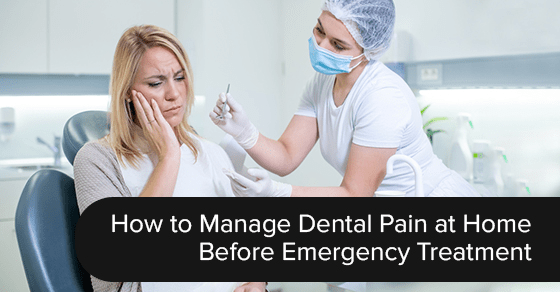
Accidents and dental emergencies are never something that we are prepared for, yet, they should be something we act on quickly for the best results and less damage. Certain dental issues are at risk of worsening the longer they are left untreated.
Once you’ve noticed unusual pain, bleeding, or perhaps broken/missing teeth, the first thing you should do is contact your dental team. As soon as an emergency treatment is scheduled, you will need to manage the pain and symptoms for a little while on your own.
Usually, self-care consists of over-the-counter medications, cold compresses, and being very careful to avoid the area in question. However, there are a few other ways to manage dental pain at home before your treatment or surgery. Keep on reading to find out the steps you should take in the event of a dental emergency and how to make sure you are covered.
Keeping your head elevated throughout the day and during the night can help alleviate stress on the body and keep airways open. Sleeping with your head elevated will also help to promote good blood circulation.
If you are suffering from a dental injury or dental pain, keep your head elevated as much as possible to help diminish pain and promote healing in the body.
A cold compress is a common trick that helps alleviate pain from toothaches and other dental ailments. Just press the ick pack or cold compress against your mouth to start feeling the benefits.
This will help numb the area so you will feel less pain. You may ice your cheek/mouth area for 10-15 minutes at a time for best results.
Salt water is a common remedy for dental ailments. If you are bleeding in the mouth or your gums, rinsing with salt water can help control and manage bleeding while alleviating symptoms.
Just mix a tablespoon of salt water in a glass of lukewarm water and gargle periodically. This can also help if the tissues in your mouth or gums are irritated, hurt, or bleeding.
It goes without saying you should try your best in any dental emergency to stay calm and observant. Write down any pain and symptoms you experience so that you can relay important information to your dentist when you see them. Don’t panic or spiral into an anxiety attack.
Most dental emergencies can be treated promptly and effectively by your dentist. They will know what to do, and you can rest assured that you will soon be in good hands. The more you panic, the more undue stress you will cause yourself physically and mentally.
While you can’t help but focus on the painful area, it’s never a good idea to fiddle too much with your teeth or gums if you have a dental emergency. If you feel something is stuck in your teeth and you’ve already tried to remove it with some floss, do not pick at it with needles or toothpicks.
If you do this, you run the risk of aggravating the area further. This may cause even more pain, bleeding, or swelling. It’s best to be gentle with the area in question and leave the prodding to the professionals.
It should go without saying that popcorn during a dental emergency is a no-no. Those pesky kernels can easily get stuck between teeth and cause more harm than good.
Try to limit the foods you eat to those that don’t require much chewing. Soft foods, for example, are easy on the teeth and gums. Avoid hard candies and foods likely to get stuck in your teeth.
Over-the-counter pain medications such as Advil and Tylenol can come in handy while you await emergency dental care. These medications will help you manage pain and make it easier to go about your day as normal.
If you are still in pain, ask your dentist for prescription medication or consider taking some time off work and from your ordinary obligations. After all, rest can do wonders for the body and help you to manage pain better.
As with eating hard foods, smoking is also a no-no when about to undergo emergency dental treatment. Your dentist will usually tell you to avoid cigarettes and smoking. This is because smoke can linger in your mouth and cause infections or further issues.
It’s also best to avoid smoking after your dental treatment (especially if you are having surgery). Remember that the body needs time to heal, and it will be harder to do so if you continue with unhealthy habits like smoking.
Here, at Oakville Place Dental Office, we offer our patients only the best emergency care services. We pride ourselves on timely attention to the most urgent dental matters and will do our very best to ensure the patient is comfortable and at ease throughout treatment.
If you believe you are experiencing a dental emergency, you may notice symptoms such as bleeding, sore/swollen gums, jaw pain, and broken teeth. We are equipped to handle any of your dental concerns, so please do not hesitate to contact us in the event of a dental emergency so that we can book you right away.
Being in the midst of a dental emergency can be scary and unpredictable; however, it’s important to remember that you are never alone. Our team at Oakville Place Dental Office is professional, courteous, and knowledgeable. We can act quickly and efficiently to help mitigate dental issues and promptly get you the treatment you need.
We provide emergency dental service for any issues, including broken teeth, jaw pain, loose fillings, and more. For more information on our emergency dental service, please call us at 905-842-6030 or contact us here. Remember that timely service is crucial, so don’t delay in contacting a reputable professional for your dental concerns.
 0 Comment
0 Comment